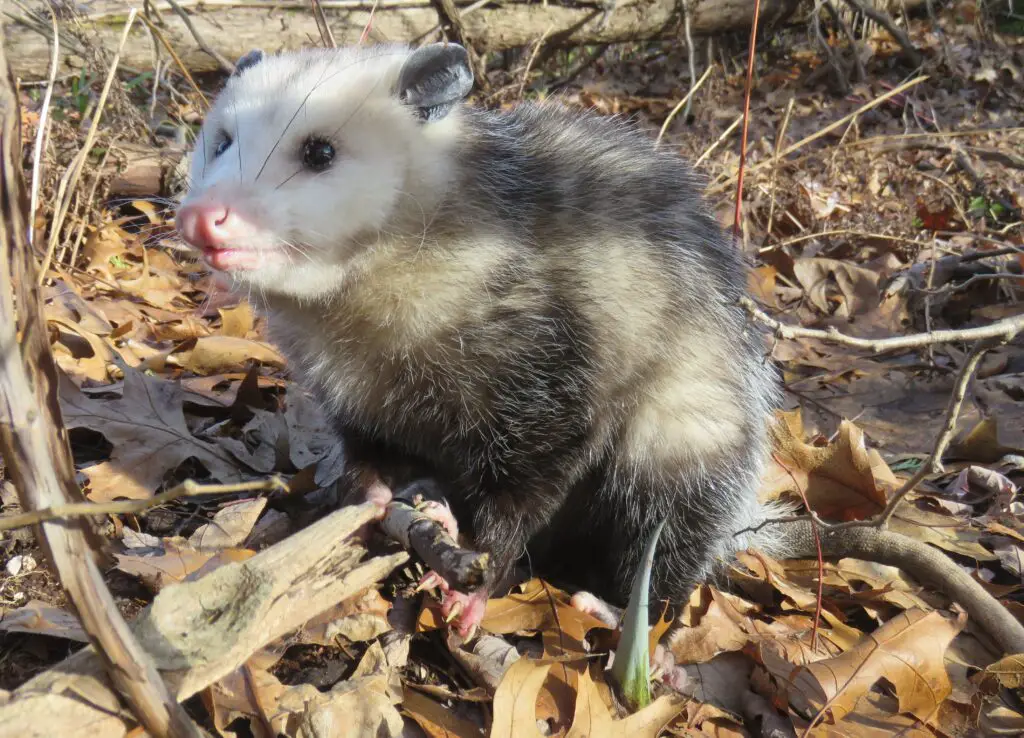Opossums are one of nature’s more misunderstood creatures, often causing fear or confusion with their unusual appearance and nocturnal habits. However, these fascinating animals play an essential role in their ecosystems and have a variety of unique traits that make them stand out among mammals.
As North America’s only native marsupial, opossums are highly adaptable and resilient, thriving in a wide range of environments, from urban areas to natural forests.
What makes opossums so special is exploring their unique behaviors, habitats, and contributions to the environment. To learn more about the diverse and resilient marsupials that share some similarities with opossums, check out our comprehensive guide on marsupials.
Scientific Classification and Physical Traits of Opossums
Table of Contents
ToggleOpossums belong to the order Didelphimorphia and are native to North and South America. The Virginia opossum, commonly seen in North America, is the most recognized species. Opossums vary in size and appearance, but they typically have a robust body covered in coarse fur, a long, prehensile tail, and sharp teeth that help them adapt to an omnivorous diet.
- Size and Coloration: Virginia opossums are medium-sized, usually 2–3 feet in length, including the tail, and weigh between 4 to 15 pounds. Their fur is typically grayish, with lighter patches on the face and belly.
- Unique Features: Opossums have a prehensile tail that helps them grip branches for balance, although they don’t actually hang by their tails, as commonly portrayed. They also have opposable thumbs on their hind feet, which give them excellent grip and climbing abilities.
Adaptations and Behaviors That Make Opossums Unique
Opossums are incredibly resilient creatures with a range of behavioral adaptations that help them thrive in diverse environments. One of the most famous of these is their ability to “play dead,” also known as thanatosis.
- Playing Dead (Thanatosis): When threatened, opossums can enter a temporary state of shock where they lay motionless, emit a foul smell, and even secrete foam from their mouths. This defense tactic makes them appear dead to predators, who often lose interest and move on.
- Nocturnal Lifestyle: Opossums are nocturnal, meaning they are most active at night. This behavior helps them avoid daytime predators and forage for food with less risk. Their large eyes aid in seeing clearly in low light.
- Diet and Foraging Habits: Opossums are omnivores, with a highly varied diet that includes fruits, small animals, insects, carrion, and even ticks. Their diverse diet makes them valuable to ecosystems, as they control insect and pest populations.
The Role of Opossums in Ecosystems
Although they might not be the first animals that come to mind when you think of ecological importance, opossums play several crucial roles in maintaining the health of their ecosystems.
- Pest Control Experts: Opossums consume a variety of insects, small animals, and even garden pests. They are particularly well-known for eating ticks, which helps to reduce the risk of tick-borne diseases like Lyme disease in areas where they are present.
- Seed Dispersers: By eating fruits and other plants, opossums help disperse seeds, which supports plant growth and biodiversity in their habitats.
- Natural Scavengers: Opossums often feed on carrion, cleaning up their environment and reducing the spread of disease. This scavenging role is essential for maintaining a balanced ecosystem.
Reproduction and Life Cycle of Opossums
As marsupials, opossums have a unique reproductive process. Like kangaroos and koalas, they give birth to underdeveloped young that complete their development in a pouch.
- Short Gestation and Development in the Pouch: Opossums have a very short gestation period of about 12 to 14 days. The young, called joeys, are born extremely small and underdeveloped, similar to the size of a honeybee. They crawl into their mother’s pouch, where they continue to develop for several weeks.
- Pouch Life and Independence: Inside the pouch, the joeys latch onto a teat and receive nourishment as they grow. Once they mature enough, they gradually leave the pouch to explore but often cling to their mother’s back until they’re fully independent.
Habitat and Geographic Range of Opossums
The Virginia opossum is highly adaptable and has a broad geographic range, from North America down to parts of South America. They can be found in a variety of habitats, including forests, grasslands, farmlands, and even urban areas.
- Urban Adaptability: Opossums have learned to navigate urban landscapes, often scavenging food from garbage or pet dishes. This adaptability has allowed them to thrive in cities and suburbs, although it sometimes brings them into conflict with humans.
Common Misconceptions and Myths about Opossums
Opossums are often misunderstood due to their unusual appearance and nocturnal lifestyle. Several common myths surround these animals, many of which are unfounded.
- Myth: Opossums Are Aggressive: Despite their sharp teeth and defensive hissing, opossums are generally non-aggressive and prefer to avoid confrontations. If threatened, they are more likely to flee or play dead than to attack.
- Myth: Opossums Carry Rabies: Unlike many mammals, opossums rarely contract rabies due to their lower body temperature, which makes it harder for the virus to survive.
Conservation Status and Threats Facing Opossums
Opossums are generally stable in terms of population and are not currently considered endangered. However, they face various threats, particularly from human activity.
- Habitat Loss and Urbanization: As cities expand, opossums lose natural habitats, which sometimes forces them into closer proximity to humans.
- Road Mortality: Opossums are frequently victims of road accidents due to their nocturnal behavior and tendency to freeze when startled by car headlights.
In addition to these challenges, opossums face predation from domestic pets, foxes, and other predators in areas where they have no natural defenses.
Interesting Facts About Opossums
Opossums are full of surprises, with some fascinating characteristics that make them unique among mammals:
- Immunity to Snake Venom: Opossums have a natural resistance to snake venom, which allows them to prey on venomous snakes without much risk. This immunity is due to specific proteins in their blood that neutralize toxins.
- Low Body Temperature: Their cooler body temperature helps opossums resist many common diseases, including rabies.
- Unique Dropping Habits: Unlike most animals, opossums create latrines, or dedicated areas, for their droppings, helping keep their surroundings cleaner.
For more information about other marsupials with similarly unique adaptations, check out our in-depth article on the incredible world of marsupials.
How to Coexist with Opossums in Your Area
If you encounter opossums in your yard, there are ways to peacefully coexist with these beneficial animals.
- Benefits of Having Opossums Nearby: Since opossums help control pests like ticks and other insects, they can be a helpful presence in your garden or yard.
- Tips for Minimizing Conflict: To prevent opossums from getting into trash cans, use secure lids and avoid leaving pet food outside overnight. If you have a garden, fencing can help keep curious opossums from exploring.
Remember, opossums are harmless and non-aggressive animals. By taking a few precautions, you can appreciate their presence without worry.
Frequently Asked Questions About Opossums
Q: Do opossums make good pets?
A: Generally, opossums are best suited to the wild. While they may be docile, they have specific needs that are difficult to meet in a domestic setting.
Q: Are opossums dangerous to pets?
A: Opossums are non-aggressive and pose little risk to pets. They are more likely to avoid confrontation altogether.
Q: What do opossums eat?
A: Opossums have an omnivorous diet that includes fruits, insects, small animals, and carrion. This makes them useful for pest control.
Q: Can opossums help reduce ticks in my yard?
A: Yes! Opossums consume large numbers of ticks, which helps decrease the spread of tick-borne diseases.
Q: Are opossums social animals?
A: No, opossums are generally solitary, only coming together briefly for mating.



